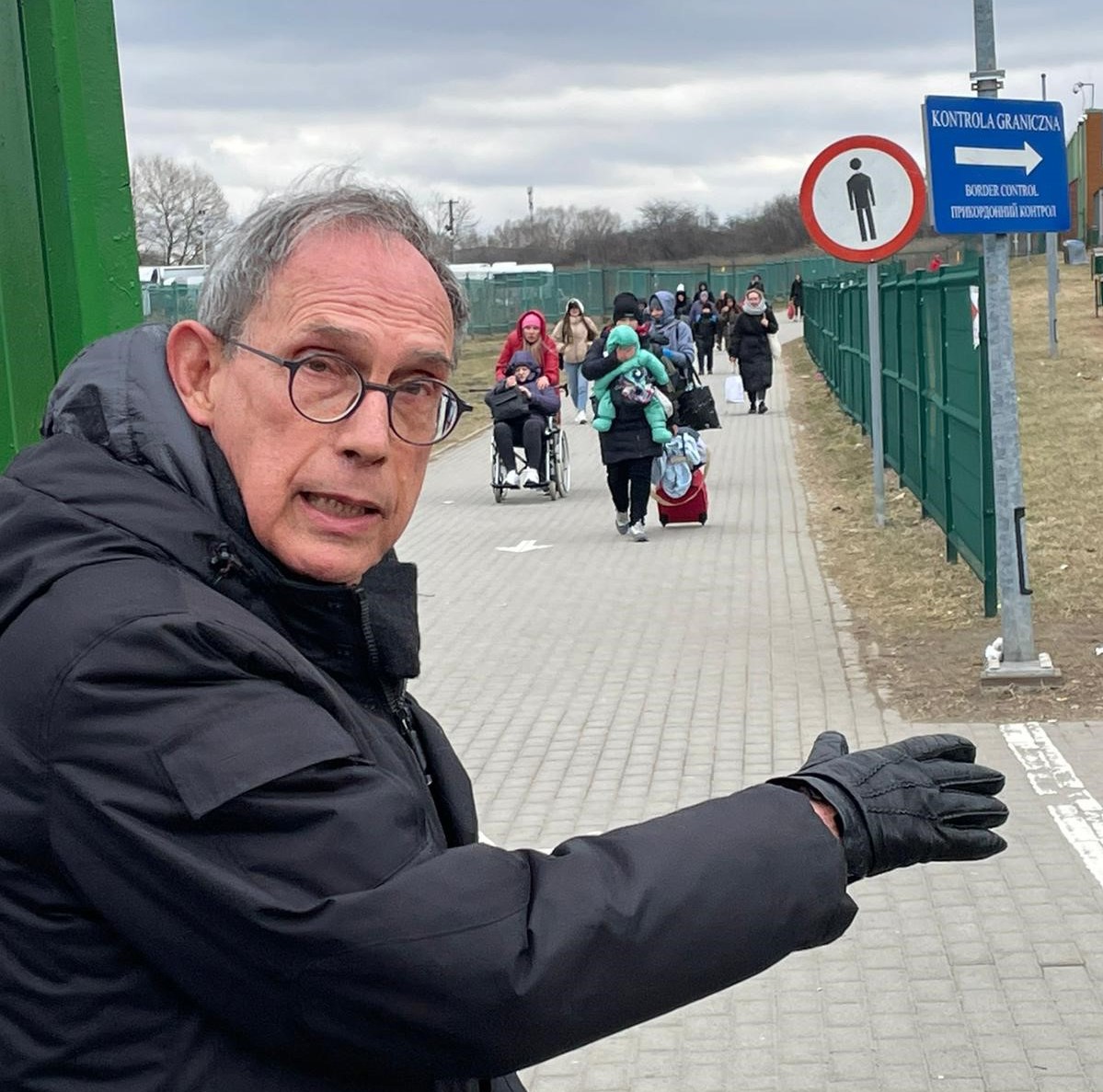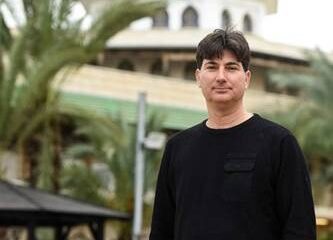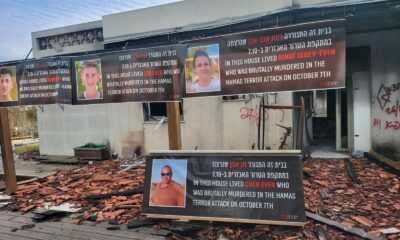
Banner

Israel offers hope on a wing and a prayer
Published
2 years agoon
As an endless column of humanity streams across Ukraine’s border with Poland, there are countless aid agencies and Polish citizens waiting to meet them. Among them, one Israeli minister stands tall, quietly contemplating how Jewish people once were refugees here too, but now have a state that can play a role in ending the suffering.
“As a people who have known suffering and hardship, right here on the frozen soil of Europe, I cannot help but speak as an Israeli, as a Jew and as a human being,” said Israel’s minister of diaspora affairs, Nachman Shai, on a visit to the Medyka border crossing between Poland and Ukraine on Tuesday, 8 March 2022.
His was the first public visit by an Israeli minister to Eastern Europe since Russian’s invasion of Ukraine.
“The state of the Jewish people cannot close its gates at such a time. As a minister of the Israeli government, I will continue to fight to keep the gates of the state of Israel open to refugees from this terrible war,” he said.
The minister said his trip was made to send “an unequivocal message” of unity to the Jews of Ukraine. “We’re with you,” he said. “From far and even from near, here on the ground, at any time of need. The Jewish people and Israel are supporting you and we’re full of hope that this terrible war will swiftly come to an end.”
Lior Hayat, the spokesperson for Israel’s ministry of foreign affairs, has also been at the Polish border and seen the river of humanity streaming across it. “There are many women with lots of kids. Ukrainian men who can fight aren’t allowed out. They stand for hours on the border. It’s a terrifying and sad situation. I told my wife that I feel the pain of this image in my DNA, in my collective memory. Because our people have been there. It’s part of our past. We have to do something, we cannot look the other way,” he told the SA Jewish Report.
As the region faces its greatest mass exodus of refugees since World War II, Israel is stepping in to help anyone who needs it. One of the country’s most meaningful links to Ukraine is that its only female prime minister, Golda Meir, was born in Kyiv. Now that link is being strengthened as the Jewish state is naming its Ukrainian field hospital Kochav Meir (the star of [Golda] Meir), shining a light of hope in the darkest of hours.
“The advanced team is crossing the border from Poland to Ukraine as we speak,” Hayat told the SA Jewish Report on Tuesday morning. Though thousands upon thousands of people are fleeing war and devastation, the Israelis are heading in the opposite direction, setting up this one-of-a-kind field hospital on Ukrainian soil. It will focus on the needs of women and children. There will be a paediatric centre, a maternitycentre and all aspects of care for refugees moving to the West, says Hayat.
Hayat says Israel has approached the situation with five different forms of outreach. The first is that since the invasion began, it has sent in 100 tons of humanitarian aid. This includes medical supplies, tents, blankets, sleeping bags, winter clothes and water desalination units that can provide fresh water to more than 200 000 people.
The second is “mega-generators” sent by Israel that will be able to keep the power on in hospitals and other crucial institutions. Third, Israel is sending 20 to 40 tons of medical supplies every week. “We’ll send it until they don’t need it anymore. It’s all based on their needs,” says Hayat.
Then, Israel has opened refugee centres at five border crossings: Poland, Moldova, Slovakia, Romania and Hungary. There, it provides refugees with support and resources, especially warm clothes. “We noticed that many are leaving Ukraine with very little and they have so many children. So, we’re focusing on helping them with the winter clothes they need.
Finally, there’s the field hospital, which will give refugees the care they need before they cross the border.
And then there’s Israel’s efforts to help Jews make aliya. Rebbetzin Grunie Lipskar Uminer grew up in Johannesburg and is one of Rabbi Mendel and Rebbetzin Mashi Lipskar’s nine children. Now living in Chestnut Hill, Massachusetts, she prayed from afar as her husband’s cousin, Chani Segal, fled from Ukraine with her 12 children – the youngest being only two months old.
Segal and her husband were Chabad shluchim (emissaries) in the city of Kharkiv, Ukraine. They lived a fulfilling and holy life serving a thriving community. But it all came crashing down when Putin invaded. The Segals spent their first Shabbat of the invasion sleeping in a bunker surrounded by their own children and others’ youngsters. They spent their second Shabbat travelling West to save their lives. After 72 hours of a harrowing journey, they became among the hundreds of Jews rescued by Israel.
In an emotional video, you can see Segal arriving at Ben Gurion Airport, holding her baby in her arms. Young men sing in celebration as she and her family are welcomed to safety. The moment is bittersweet as joy and sadness are reflected in her eyes.
This is a time when the reason for a Jewish state has become crystal clear. According to official numbers from Israel released on 9 March 2022, three flights carrying a total of 220 olim, along with an additional 100 orphans, arrived in Israel on Sunday, 6 March. Another 250 are expected to arrive on Wednesday [9 March].
At least 2000 Jews have arrived at aliya processing centres run by the Jewish Agency and the International Fellowship of Christians and Jews (IFCJ) in countries bordering Ukraine. At least 4,130 beds have been rented in hotels and other facilities in neighbouring countries along the Ukraine border to accommodate the thousands of Jews seeking to make aliya. At least 15,600 calls have been received by the Jewish Agency’s special hotline, 6,600 of which were from Jews seeking to make aliya as soon as possible. Other calls came from concerned relatives in Israel, seeking guidance on how they could help their loved ones in Ukraine.
In the bigger picture, Israel might be facing a wave of aliya not seen in decades, which could change the face of the country.
The future olim are escorted from the border to temporary housing facilities, where they receive their visas for Israel. Then, they are flown to Israel, where they will stay in hotels across the country for about a month, co-ordinated by the ministry of aliya and integration. Afterwards, the immigrants will be transferred to permanent residences in communities throughout Israel.
Hundreds of Jewish and Christian volunteers have enlisted to assist these refugees, including transporting them to the Jewish Agency and IFCJ aliya centres.
The Jewish Agency is also working alongside local organisations to find additional lodging for these refugees. Call centres direct refugees within Ukraine, informing them how they can receive rescue services from the Jewish Agency, IFCJ and other local organisations. Forty volunteers staff these call centres, which are operated with the support of the ministry of aliya and integration. Most of those volunteers have either immigrated to Ukraine or have family and friends in the country.
For those staying behind, 150 community organisations across Ukraine identified by the Jewish Agency’s Security Assistance Fund will receive immediate protection assistance. This budget will be used to implement security measures at Jewish organisations and institutions across the country.
“We set up operations in four countries all at once, saving hundreds of lives a day,” says a representative of the Jewish Agency, who asked to remain anonymous. “Thousands of hotel beds are ready. We have provided buses and staff at borders, meals,and as much emotional support as we can give.”
But there are Ukrainian Jews who would like Israel to do more. Ilya Bezrucho, a refugee from Kyiv now living in Lviv, says with Israel’s humanitarian experience, it could assist in the creation of humanitarian corridors for the evacuation of people from areas under heavy shelling. “Currently, this is being done poorly, often by religious communities with no physical protection,” he says.
He would also like doctors with combat experience to assist military hospitals and for Israel to organise a group of Shaldag special-unit commandos to evacuate Jewish refugees from the most dangerous areas of Ukraine.










